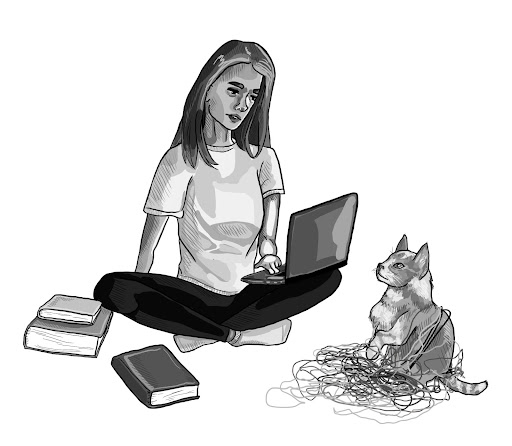When a guide is not provided, it’s up to us to navigate
March, 2020
A few months ago when the novel coronavirus first hit in Wuhan, China, most PHS students never thought that we would experience what was happening overseas. But as the outbreak moved closer and closer to Princeton, panic began to spread as the reality of its presence started to hit. Schools across the U.S. have shut their doors and sent students home. In the face of this crisis, Princeton High School’s faculty has worked hard to prepare for a shift to remote learning. Despite the efforts of teachers across the nation, this unprecedented and ever-evolving outbreak has exposed the fatal flaws in America’s prized education system as well as the federal government’s severely inadequate response, drastically undermining their efforts. In moments like these where the federal government does not provide the necessary oversight to effectively combat an outbreak, both local communities and individuals need to be vigilant in the face of a global crisis.
Put simply, America’s national education system has failed to keep up with the needs of its students, teachers, and staff in a time of crisis. In times like these when there is little to no universal plan or organization on a national level, local communities like Princeton need to act on their own by taking their own measures to curb the spread of the pandemic.
The most common defense across the country has been to opt for online schooling instead of brick and mortar institutions. Princeton Public Schools have been no exception. While there were many successes, it is a reach to say that PHS’s transition to online learning had no shortcomings. Such downfalls were largely as a result of a lack of guidance. It seems as if the government is making demands without giving us any solution or aid. For the past two weeks of remote learning, most PHS students have seen PowerSchool Learning’s “kitten detangling units'' more than their actual assignments. On multiple occasions, slowdowns and even crashes in the district’s Powerschool Learning system have kept students and teachers alike out of their classes. Short notice about the switch also left teachers scrambling to readjust lesson plans and find ways to meet virtually with students. Worse, teachers lack a direct channel of communication with their students. An unreliable Powerschool Learning network paired with an email system rarely used by students has left teachers without an efficient means of communicating with their students. Because there has been little to no government-level response for this, local communities must do this work. The district needs to revamp its digital infrastructure to provide a sufficient platform for students, parents, and teachers. That means better communication within classes, a more reliable learning platform, and more accessible support. Instead of pursuing a school-wide email system that has proven to be ineffective, the district should take student’s personal emails to streamline communication. Even with some efforts, Princeton remained woefully unprepared in the face of a growing crisis. The severe shortage of readiness beforehand has all led to the district’s dire position now. This lack of adequate digital infrastructure to support schools in the district has left students stressed, teachers worried, and staff overworked.
Making the switch from in-person to at-home learning not only complicates assigning work and teaching lessons, but also how to continue providing the care needed by low-income families within the district. While many food banks are remaining open, their biggest concerns relate to the health of warehouse workers. For the Food Bank of New Jersey, the question that remains up in the air is, “Not being able to be near each other, how do we protect the staff, how do we protect the people that we serve?” During a time where social distancing is critical for “flatten[ing] the curve” of coronavirus cases and the government fails to take responsibility, the well-being of many depends on community volunteers.
Because America’s education system lacks the means to tackle such an issue in crises like this, local districts must take action on their own. “Nearly 500 students … rely on [Princeton Public Schools] for breakfast and lunch.” said Superintendent Steve Cochrane in a statement made on March 16. Closing the school would mean the loss of a food source for these students for an indefinite amount of time. Luckily, before the shut down of the school on March 12, PHS’s students and teachers came together to box over 500 meals to go home to families at PHS who receive subsidized meals. Additionally, 15 school buses with district-provided meals were set up for families as well. While the number of students who depend on free or reduced lunch in Princeton is relatively low and manageable, the National Center for Education Statistics finds that nationwide, 51.8 percent of all students are eligible for free or reduced lunch. This astounding number only exemplifies the government’s failure in addressing income inequality, poverty gaps, and alleviating household burdens. Such faults shine through in moments of crisis like now. Millions of students should not have to depend on their schools for meals. When their schools become inaccessible like now, students in lower socioeconomic brackets are left in the dust. America needs to step it up before it’s too late.
But combatting this outbreak not only means that the federal government needs to do its part, but the whole community as well. We must remain vigilant in social distancing, avoiding large groups, and only going outside when necessary. When no cure is readily available, Princeton as a town needs to be responsible for protecting itself.
The COVID-19 outbreak has betrayed the American education system’s inadequacy in protecting schools when they need it most. In a time when the nation’s education system cannot keep up with the needs of students, faculty, and parents, the district and community must do their share in mitigating the crisis.